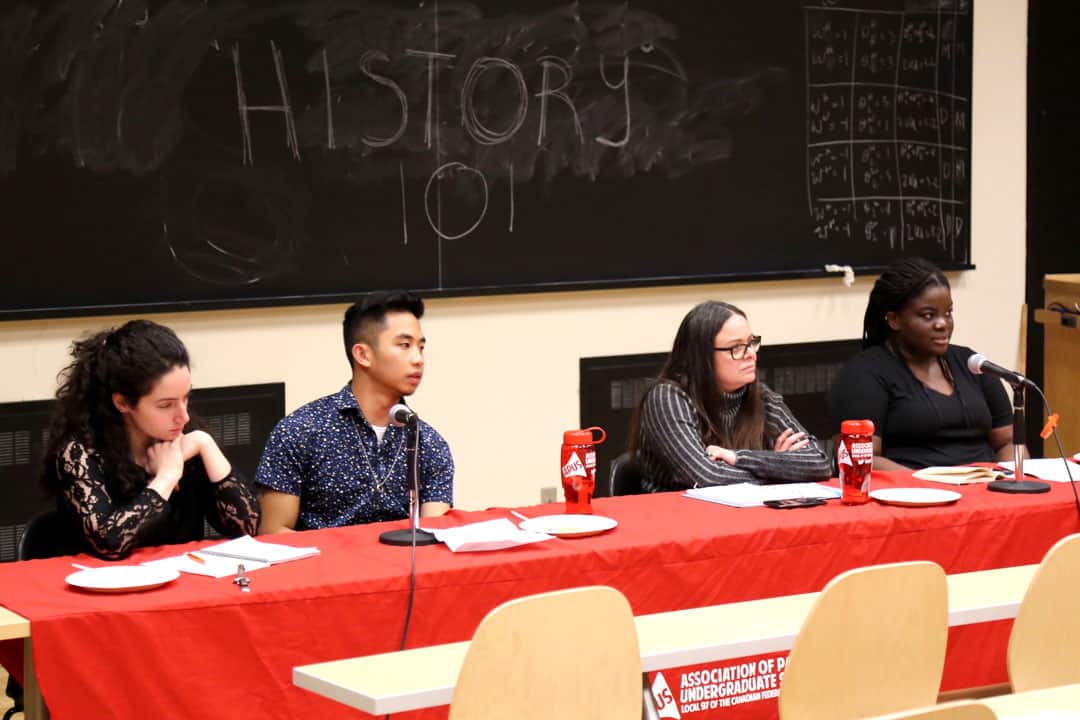Resisting Education: Stories of Defiance and Perseverance — an event held by the Association of Part-Time Undergraduate Students (APUS) — took place in UTSG’s Claude T. Bissell Building on November 30 to discuss issues faced by students in postsecondary institutions across Ontario.
The event featured a panel of guests that included Nour Alideeb, former University of Toronto Mississauga Students’ Union (UTMSU) President and current Chairperson for the Canadian Federation of Students–Ontario (CFS-O); Francis Pineda, President of the Continuing Education Students’ Association of Ryerson (CESAR); Michelle Mabira, 2016–2017 President of U of T’s African Students’ Association; and Phyllis McKenna, Vice-President Equity and Campaigns of CESAR. Moderating the event was Mala Kashyap, President of APUS.
A range of issues concerning postsecondary students were raised by the panelists. Alideeb started the discussion by saying that access to postsecondary education is a “right, not privilege.” Citing the funding structure for public postsecondary institutions, particularly U of T, Alideeb said the university has become a “publicly assisted institution” instead of “publicly funded,” with some of the highest tuition costs in Canada as well as steep costs for international students.
“Is our degree that great just because we slap on ‘U of T’?” asked Alideeb. She also pointed out solutions from her work at the CFS-O, in particular her lobbying for the Ontario Student Grant, as a starting point for reducing student fees and eliminating provincial interest on student loans.
McKenna focused on Indigeneity and the issues Indigenous students face when it comes to access to education. As an Indigenous woman, McKenna criticized the low graduation rates for Indigenous students in postsecondary institutions, as well as limitations on funding for bursaries and grants due to inadequate government funding.
Mabira relayed a perception of apathy on the part of the university administration toward marginalized students. Describing the process of reporting racism to university administrators as a “lottery,” Mabira attributed deep-rooted racism within the university to a “culture of persecuting people who can challenge the way the system is built and run.” She alluded to recent reports of anti-Black racism on campus as the product of a culture of racism and ignorance.
A part-time student at Ryerson University, Pineda discussed the importance of improving access to postsecondary education, as well as keeping in mind the struggles that part-time students face at these institutions. Accessing bursaries and grants is difficult for part-time students, especially those who may incur debt over an extended period during school, said Pineda. He described in detail his own experiences as a part-time student dealing with debt and the long period of time it took for him to earn his degree.
In response to a question about solutions to the particular issues raised by the panel, McKenna conveyed a hope for diversifying approaches to education and changes to “the idea that Western worldviews are not the epitome of education.”
Alideeb, speaking from her experience with the UTMSU, said that discussion and trust are the basis for change. “If we don’t have the mechanisms to talk to each other about the things that we have problems with, we cannot find solutions to them and move forward.”
When asked about the practicality of solving issues that were raised by her fellow panelists, Alideeb responded with optimism about future conversations, specifically mentioning her past success with the ‘Fight the Fees’ campaign and the Ontario Student Grant. She emphasized the importance of the University of Toronto Students’ Union collaborating with student groups to work on tackling issues. “We need to be working with people to understand the issues — that way we can tackle them.”


